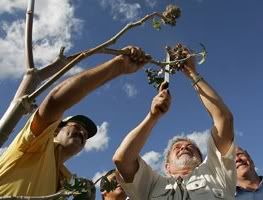Brazil's Lula to take biofuels to the G8 as a geopolitical weapon
 Agência Brasil reports [*Portuguese] that the G8 Summit which unites the world's seven most industrialised and 'developed' countries (Canada, France, Germany, Italy, Japan, the United Kingdom and the United States) along with Russia has reserved a place for the Brazilian government to present its plans for the development of a global ethanol and biodiesel industry aimed at fighting climate change. The summit takes place in June of this year and is hosted by Germany, which currently holds the EU's rotating presidency, and which has put global warming and energy security at the top of the agenda.
Agência Brasil reports [*Portuguese] that the G8 Summit which unites the world's seven most industrialised and 'developed' countries (Canada, France, Germany, Italy, Japan, the United Kingdom and the United States) along with Russia has reserved a place for the Brazilian government to present its plans for the development of a global ethanol and biodiesel industry aimed at fighting climate change. The summit takes place in June of this year and is hosted by Germany, which currently holds the EU's rotating presidency, and which has put global warming and energy security at the top of the agenda.Combative, president Luiz Inácio Lula da Silva told reporters at the Palácio do Planalto that biofuels have become a geopolitical weapon for the Global South:
"At this forum, the G8 will discuss climate change. We are going urge delegates to help develop ethanol and biodiesel on a planetary scale. We will plant sunflower, jatropha, and a range of other crops across the globe, that will sequester carbon dioxide [in the form of low carbon fuels]. We will do so to capture the money that was promised to poor countries but that was never delivered."Brazil's main contribution to climate change comes from deforestation, but in the industrialised world greenhouse gas emissions come from the massive use of fossil fuels - coal, natural gas and oil - in transport and industry. Bioenergy and biofuels are carbon neutral and non-polluting. Lula said that for this reason global energy politics cannot remain static; switching fuels is part of the future:
"We do not want people abandon the use of oil. But what we want to say is the following: do we want to clean up the planet? Do want to diminish warming of the planet? Do we want to improve air quality? Then use renewable fuels - Brazil will be your partner."The president said he will act as a "propaganda boy" for biofuels amongst the big boys from the countries who pollute many times more than Brazil, and who have been polluting for more than 200 years:
 bioenergy :: biofuels :: energy :: sustainability :: ethanol :: biodiesel :: biomass :: Brazil :: G8 ::
bioenergy :: biofuels :: energy :: sustainability :: ethanol :: biodiesel :: biomass :: Brazil :: G8 :: Sugar cane and labor conditions
"I am going to the G8, and from the first second they start to talk about climate change, I will be sitting there with my portfolio of biofuels, and I will say: here they are, you want to tackle global warming? Here are castor seeds, jatropha nuts, soybeans, cotton seed, oil palm fruits. Global energy politics will not lack the motivation to utilise these resources."
Asked about the actions the government will take to prevent the exploitation of slave labor on sugar cane plantations, the President said there will be two steps taken towards that aim. The first one is to consolidate and promote ethanol's position - at least conceptually - as a viable and exceptional fuel source in the global energy matrix, that can be produced by countries in the South.
"In a second step, the question of the humanisation of the sugar cane sector in this country will be tackled, by opening a dialogue between the private companies and the workers, in order to improve labor conditions so that they can become professional citizens who can make the most of their lives."
President Lula did not exclude the possibility of sending a draft law to Congress aimed at rooting out manual slave labor once and for all. [Note: compared to previous governments, the current Brazilian executive has already made considerable progress on this front, by legislating working hours and by implementing a registration program that forces all companies to identify its workers, so the government knows who, when and where anyone is working.] "If it takes a law, we will make one ourselves, in collaboration with the labor union movement", the president concluded.
Image: Brazil's Lula harvesting castor beans for biodiesel.
More information:
Agência Brasil: Brasil vai apresentar em reunião do G 8 formas de incentivar biodiesel e etanol - May 15, 2007.
 --------------
--------------
 According to Salvador Rivas, the director for Non-Conventional Energy at the Dominican Republic's Industry and Commerce Ministry, a group of companies from Brazil wants to invest more than 100 million dollars to produce ethanol in the country, both for local consumption and export to the United States.
According to Salvador Rivas, the director for Non-Conventional Energy at the Dominican Republic's Industry and Commerce Ministry, a group of companies from Brazil wants to invest more than 100 million dollars to produce ethanol in the country, both for local consumption and export to the United States.








0 Comments:
Post a Comment
Links to this post:
Create a Link
<< Home